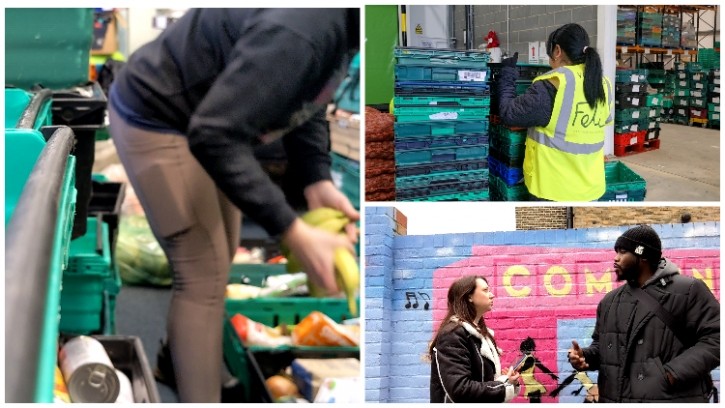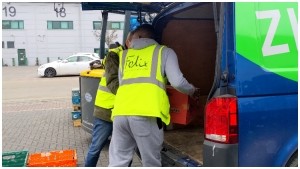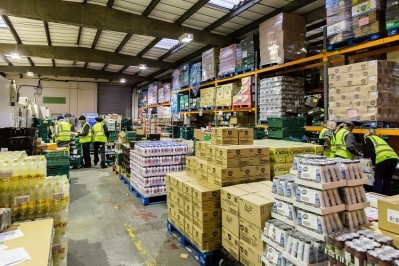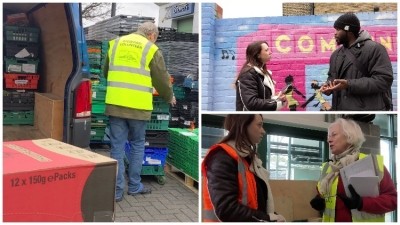Feature
The benefits of working with a redistribution charity

Food security in the UK is said to be among the worst in Europe, especially for children.1
In 2018, the UK Stakeholders for Sustainable Development (UKSSD) found that while overall implementation of the sustainable development goals (SDGs) in the UK – which includes food security – were seeing positive action, the “most vulnerable places and people in our society are increasingly being left behind”.2
Of the SDGs related to food insecurity, all were considered to have some gaps in policy (rated amber), with the UK not performing well enough or performance deteriorating in many areas, and goal 2.2 being identified as ‘red’ – little to no policy/poor performance.3
With the nation now in the grip of a cost-of-living-crisis, food insecurity is worsening. According to a parliamentary paper,4 from June to July 2022, of the 91% of adults in Great Britain who reported an increase in their cost of living, 95% saw the price of their food shopping rise, with 44% having to spend less on essentials, including food, as a result.
Commenting on the current climate, Richard Smith, deputy head of food supply at food redistribution charity The Felix Project, said: “Food security feels like it’s getting worse in the UK; our waiting list is only growing – and at the moment, we barely have enough food for the charities we’re working with. It feels worse than the pandemic levels.”
What is classed as food poverty?
The aforementioned paper suggests that there is no widely accepted definition of ‘food poverty’. But it notes that a household can be broadly described as experiencing food poverty if they cannot (or are uncertain about whether they can) acquire adequate quality or sufficient supplies of food in socially acceptable ways.
Professor Timothy Lang, who spoke recently to Food Manufacture in its documentary on UK food security, has previously defined it as “worse diet, worse access, worse health, higher percentage of income on food and less choice from a restricted range of foods”. 5
What is the cause of food poverty and who does it impact?
Food poverty is largely a result of low income, with food insecure households potentially unable to afford enough good quality food or the associated transport or delivery costs. In this way, it’s similar to other types of poverty, however, as the parliamentary paper noted, it is a particularly visible form of poverty due to its elasticity. In other words, a food budget can be altered whereas rent or fuel cannot. It is therefore, quite often one of the first things that low-income individuals/families start cutting back on.6
Data from the UK Government suggests that household food insecurity impacts Black led households much more,7 whilst other research found two in three households using food banks included one or more people with a disability.8
Demand for food banks succeeds supply
There are a whole host of food redistribution organisations and charities available for retailers, farmers and manufacturers to collaborate with to help address this issue, including upcycling businesses like ToastAle, which recently featured on our webinar around food waste, as well as more community focused initiatives such as FareShare and the previously mentioned London-operating, The Felix Project.
Like the community hubs they provide, The Felix Project and FareShare mostly rely on the good nature of volunteers to keep them going. For FareShare that’s over 4,800 people that lend their time at its regional centres, sorting and packing surplus items before delivering it to charities in the depot’s local area.
But as Smith (and the numbers) demonstrate, demand for these kinds of services is extremely high and it is in dire need of more support from retailers, manufacturers etc.
FareShare’s wider network supports 9,500 charities and community groups, including those in Greater London working directly with The Felix Project. However, The Felix Project has a waiting list of over 600; as such, the charity has seen tremendous growth, expanding from two to four depots and introducing a kitchen to its mantle.
The kitchen has been a real gamechanger for The Felix Project, Smith told Food Manufacture, as it enables the company to create healthy meals from the ingredients it receives and rescue all sorts of food – from larger pack sizes to shorter shelf-life items. The kitchen, which is based in Poplar in London, makes up to 4,500 meals a day, which are then distributed to all its connected charities and schools in London.
FareShare, which already holds the title for the largest food distribution charity, is also looking to grow; keen to increase the levels of food it redirects (almost 54,000 tonnes last year).
But this won’t be possible unless further collaborations are made. In fact, The Felix Project recently put out an urgent call for new suppliers to help it meet the extra 50 tonnes of food it plans to deliver, following financial support from the Mayor of London which should enable it to upscale weekend work.
“In a survey taken last Autumn of the 9,500 charities that receive food from FareShare, over 90% said demand for their services has increased since January 2022 due to the cost-of-living crisis. Charities have also said that this influx comes from people accessing support for the first time despite being fully employed,” Simon Millard, Director of Food of FareShare, told Food Manufacture.
“While our food partners are doing everything they can to support us, we cannot keep up with the skyrocketing demand caused by the cost-of-living crisis. We encourage any food suppliers or manufacturers to get in touch to see how we can help unlock more delicious surplus food, and get it to people in need instead of it going to waste.”
Moreover, Smith has said the recent fruit and vegetables shortages have been a hard hit on Felix and its dependents.
“This year the fresh food shortages have affected us greatly,” he said. “We have had to rely on ambient food more as a result and this is the hardest type of food to rescue because it’s such long life” – in other words, it’s less likely to need redirecting.
Working with food redistributors
Partnering with a redistributor is a win-win. Not only does it have the potential to cut costs and help the environment, but it can also help you hit key regulatory goals.
The benefits of collaboration
Speaking with both FareShare and The Felix Project, the initiatives work with their partners to identify ways of diverting and rescuing surplus food. For FareShare, its team of more than 30 account managers in the food team work closely with its partners (retailers, manufacturers etc.) to support them in this journey, with team members regularly visiting sites to learn about the processes.
The Felix Project operates in a similar way, offering “waste walks” to businesses, wherein it flags areas for consideration.
Essentially both look at rooting out food waste occurring in the business and from these assessments can provide their partners with data on where and what is being wasted.
Along with helping businesses to save money by reducing waste, initiatives like FareShare and The Felix Project also help companies to improve their sustainability credentials. In fact, Smith says that Mindful Chef’s B-Corp status, which was achieved in 2018, was reached with Felix’s help. The healthy meal kit organisation now boasts a title of being within the top 3% of B-Corps.
Items which can be redirected are incredibly diverse too, including those with packaging and labelling errors, fruit and vegetables past their best before dates, quality rejections, lines no longer being retailed, samples and NPD, foreign label stock, damaged stock, and others. There are of course some exceptions, but as co-founder Myles Hopper of Mindful Chef (which partners with The Felix Project) told Food Manufacture, there are other options.
“For us, it’s a small percentage of food that can’t be diverted because we are able to send food to consumers with a three to four shelf life anyway. But any food that isn’t deemed safe to go there, we can divert it to an AD plant on site and that will be used as fuel or fertiliser,” he explained.
As Smith pointed out: “It’s easier to give the food to us than to have it paid to be thrown away”.
It’s not just sending over bits and bobs either, food redistributors can look at innovative ways to help. One such example is Mindful Chef’s reverse advent calendars.
This, as Hopper clarified, is a community event that runs from 1 to 20 December that invites Mindful Chef customers to pay for non-perishable items to be placed into a box (the reverse advent calendar) which are then redistributed by The Felix Project at a time of need.
I’m sold! …But how does the process work and is it safe for consumers?
The food is first checked over and then transported (from manufacturer or retailer etc.) to the respective warehouse, where it’s checked again.
It’s then sorted by volunteers that pick and sort the produce – be it raw fish, ready meals, fruit or crisps – into storage containers which are placed in areas which possess the correct storage environment (i.e., chilled, frozen, ambient) depending on the product.
“We are a food redistribution charity, so we work to the same standards as a food manufacturer,” Smith confirmed.
“All food is checked twice, when collected and when it comes back here it goes through our warehouse management system, each time we’re checking the date on that food,” he continued. “To maintain chilled and frozen chains, we have big storage containers, and all our bags are chilled so we can maintain that status.”
“The biggest challenge is ensuring that food gets there on time and is safe to consume,” added Hopper, “but with the multiple ways Felix is set up, through its warehouse and kitchen, this can be done.”
Hopper explained that although Mindful Chef’s algorithms are accurate and despite customers given the opportunity to order up to 8 weeks in advance, humans enjoy routine.
“We have good forecasts, but plans do change – inevitably there’s always a change to supply and demand,” he noted.
Commenting on its own transport and safety processes, Millard said that FareShare’s experience was a benefit.
“FareShare has been redistributing edible food, that may otherwise go to waste, for over 20 years. In that time, we have honed and perfected a huge number of procedures to ensure the safety and quality of food is as high as can be,” they said.
“We have formulated a strict Hazard Analysis Critical Control Point (HACCP) study, and have a written Food Safety Management System. This demonstrates how we work safely with the huge variety and volumes of food we distribute. This system is assured by our Primary Authority partnership, which oversees all of FareShare’s policies and procedures.
“All the goods we receive are checked for quality and safety. This check is carried out by trained staff and volunteers who decide which goods meet our safety or quality standards.
“All the goods we accept are entered onto our online database which will follow the food throughout its journey. This ensures we maintain food safety standards, as well as allowing us to trace products that are recalled by the manufacturer.
“We work closely with our regional centres, carrying out regular audits ourselves and with an independent third-party auditor, to maintain and improve procedures that ensure food safety management is kept to a high standard.
“We check every one of our 9,500 charities to ensure they are using the food in a safe way and having the most significant impact on their local community.”
Interested in collaborating with The Felix Project or FareShare? Click their respective name and reach out.
References
- www.bmj.com/content/364/bmj.l126
- https://publications.parliament.uk/pa/cm201719/cmselect/cmenvaud/1491/149105.htm
- http://data.parliament.uk/writtenevidence/committeeevidence.svc/evidencedocument/environmental-audit-committee/sustainable-development-goals-in-the-uk-followup/written/91567.html
- https://researchbriefings.files.parliament.uk/documents/CBP-9209/CBP-9209.pdf
- www.sustainweb.org/foodpoverty/whatisfoodpoverty/
- Submission to the Select Committee on Food, Poverty, Health and the Environment, Hungry for change: fixing the failures in food, 6 July 2020, p41
- www.gov.uk/government/statistics/family-resources-survey-financial-year-2019-to-2020/family-resources-survey-financial-year-2019-to-2020#household-food-security-1
- www.trusselltrust.org/wp-content/uploads/sites/2/2021/05/State-of-Hunger-2021-Report-Final.pdf



















